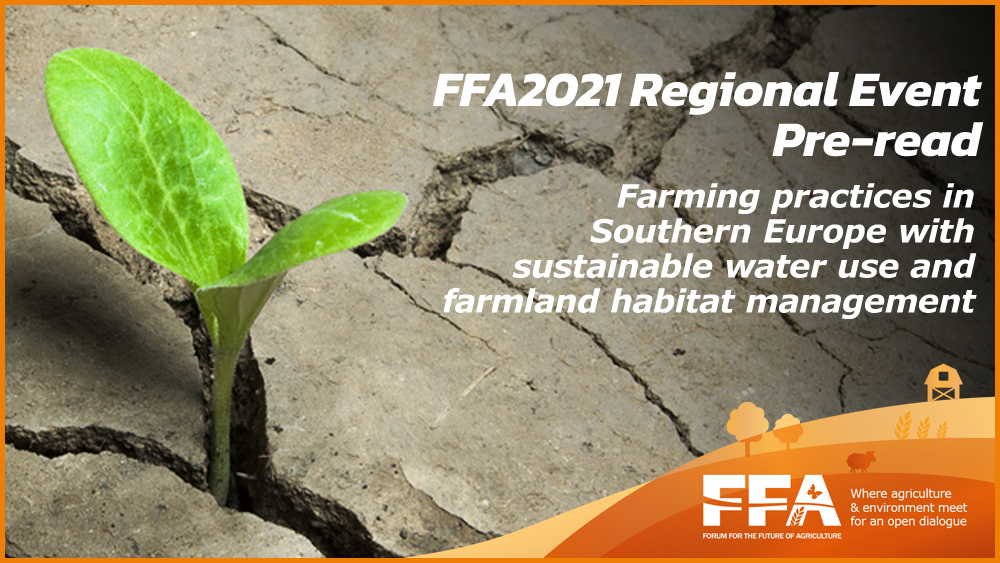Farming practices in Southern Europe with sustainable water use and farmland habitat management
FFA2021 Regional Event Pre-read
Monday, May 10, 2021
Learn about sustainable farming practices in Southern Europe with this short, pre-read for the first session of the FFA2021 Regional Portugal event.
Agriculture in Southern European countries are at high risk of droughts and overall water stress. According to the Aqueduct project of the World Resources Institute, Portugal is currently number 41 in the world when it comes to water stress – with Spain at number 28 and Greece at 26(1). All three currently rank higher than Egypt or Iraq when it comes to water stress, with droughts a particular threat. With depletion of its groundwater reserves growing, there is an increasingly narrow margin between supply and demand and even a threat of areas being left without access to piped water.
With (irrigated) agriculture representing around 75% of groundwater(2), the farming sector faces not just a significant challenge when it comes to its own survival, but also where it concerns its broader social responsibility to other water users. Citizens, natural areas, industry – all lay necessary claim to a portion of freshwater use in the EU, and in Southern countries the competition is becoming fiercer. The existing water situation in the Mediterranean belt is made increasingly unstable due to climate change; in 2021 the IPCC concluded with medium confidence that there will be an increase in the duration and intensity of droughts in the region. Droughts in the region have already put a severe strain on the state of water bodies across the Mediterranean region. Furthermore, increased droughts can have severe knock-on effects such as loss of topsoil and desertification which do not just impact farm profitability, but also farmland biodiversity and existing habitats.
Freshwater basin management cannot be left to individual actors. Aquifers and river systems cross both internal administrative units, farm surfaces, and international borders. Clearly, cooperation is not just needed at the European level to ensure equitable water access, but also at the regional level to deliver the needed water to sustain local agriculture.
If agriculture is to play its part when it comes to water use, then resource management, technological applications, and on-farm practices all need to be adapted. However, such adaptations will neither be easy nor cheap, requiring both large-scale public investment in renewing water systems at the macro level, as well as significant improvements on the individual farm level and even the micro-level of individual fields.
On-farm actions could include switching to more efficient irrigation systems, growing cover crops to control erosion, and growing different, more water-efficient crops. At the national level, actions could include construction or replacement of water management systems, better allocation methods, and punitive actions such as fines for those wasting water. Despite the availability of different actions at different levels, it is highly likely that freshwater management in Mediterranean agricultural system will remain an area of high concern until and unless serious climate change actions at the global level begin to take firm hold.
During this session, we will ask our panelists to discuss how to rapidly increase water use efficiency in Mediterranean farming – both at the micro and macro level – what targets are needed, and what the corresponding effects for the rest of the food chain should be. Last but not least, what farmland management practices could be encouraged to enhance the sustainability targets.
To join the live dialogue
Click here to register or find out more details.


